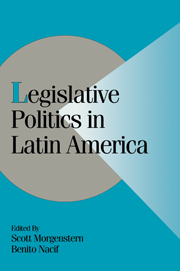Book contents
- Frontmatter
- Contents
- Tables and Figures
- Contributors
- Preface and Acknowledgments
- Party Names and Other Acronyms and Abbreviations
- 1 TOWARDS A MODEL OF LATIN AMERICAN LEGISLATURES
- Part I Executive–Legislative Relations
- 2 OSCILLATING RELATIONS: PRESIDENT AND CONGRESS IN ARGENTINA
- 3 PRESIDENTIAL CABINETS, ELECTORAL CYCLES, AND COALITION DISCIPLINE IN BRAZIL
- 4 EXAGGERATED PRESIDENTIALISM AND MODERATE PRESIDENTS: EXECUTIVE–LEGISLATIVE RELATIONS IN CHILE
- 5 EXECUTIVE–LEGISLATIVE RELATIONS: THE CASE OF MEXICO (1946–1997)
- Part II Political Parties and Legislative Structure
- Part III Legislatures and the Policy Process
- Part IV Conclusions
- References
- Author Index
- General Index
3 - PRESIDENTIAL CABINETS, ELECTORAL CYCLES, AND COALITION DISCIPLINE IN BRAZIL
Published online by Cambridge University Press: 14 January 2010
- Frontmatter
- Contents
- Tables and Figures
- Contributors
- Preface and Acknowledgments
- Party Names and Other Acronyms and Abbreviations
- 1 TOWARDS A MODEL OF LATIN AMERICAN LEGISLATURES
- Part I Executive–Legislative Relations
- 2 OSCILLATING RELATIONS: PRESIDENT AND CONGRESS IN ARGENTINA
- 3 PRESIDENTIAL CABINETS, ELECTORAL CYCLES, AND COALITION DISCIPLINE IN BRAZIL
- 4 EXAGGERATED PRESIDENTIALISM AND MODERATE PRESIDENTS: EXECUTIVE–LEGISLATIVE RELATIONS IN CHILE
- 5 EXECUTIVE–LEGISLATIVE RELATIONS: THE CASE OF MEXICO (1946–1997)
- Part II Political Parties and Legislative Structure
- Part III Legislatures and the Policy Process
- Part IV Conclusions
- References
- Author Index
- General Index
Summary
Introduction
Recent works on Latin American presidentialism (Amorim Neto 1998; Deheza 1998; Thibaut 1998) indicate that the frequency of coalition governments in this area is higher than expected by comparative theorists of this system of government (Jones 1995; Lijphart 1992; Linz 1994). While such a finding reveals that Third World presidential democracies are able to devise extraconstitutional means by which the crisis proclivity of minority presidents can be overcome, it remains to be seen whether multiparty presidential cabinets can work as parliamentary-style coalitions that in general display a high degree of unity on the floor of parliament and operate in conjunction with the executive to promote legislation.
Brazil is a good starting point to tackle this question. There is an ongoing debate in the comparative presidentialism literature about Brazil's prevalent pattern of government formation. On the one hand, Abranches (1988), Deheza (1997, pp. 192–230), and Meneguello (1998) contend that all Brazilian presidents appoint coalition governments. On the other, Amorim Neto (1994, 1995) and Thibaut (1996, pp. 282–321) caution against a loose application of the concept of coalition government to presidential systems and argue that other types of cabinets also have been formed in this country. While Abranches, Deheza, and Meneguello simply count the number of parties drafted into the cabinet to assert their coalitional status, Amorim Neto and Thibaut also look at cooptation strategies (as opposed to coalition ones) employed by presidents in their dealings with political parties and social actors, and the recruitment criteria of individual ministers.
- Type
- Chapter
- Information
- Legislative Politics in Latin America , pp. 48 - 78Publisher: Cambridge University PressPrint publication year: 2002
- 69
- Cited by



